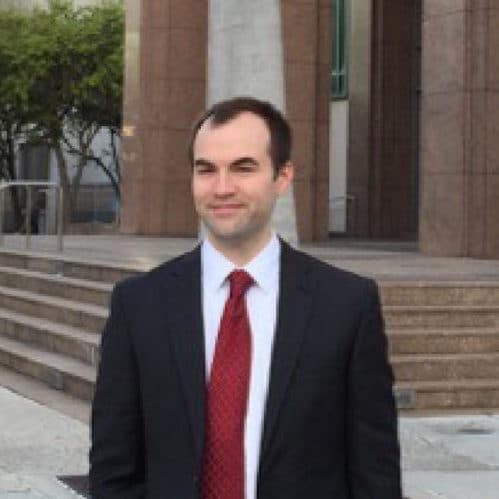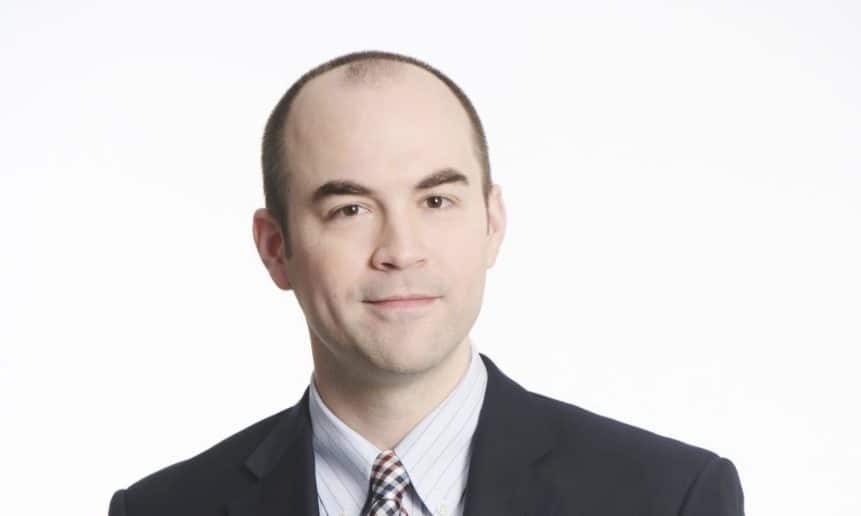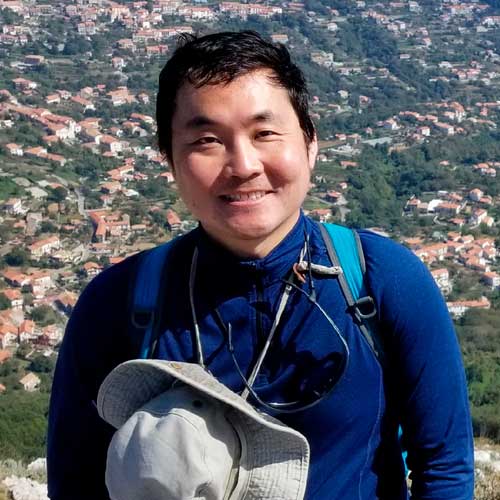Spotlight: Jamisen Etzel
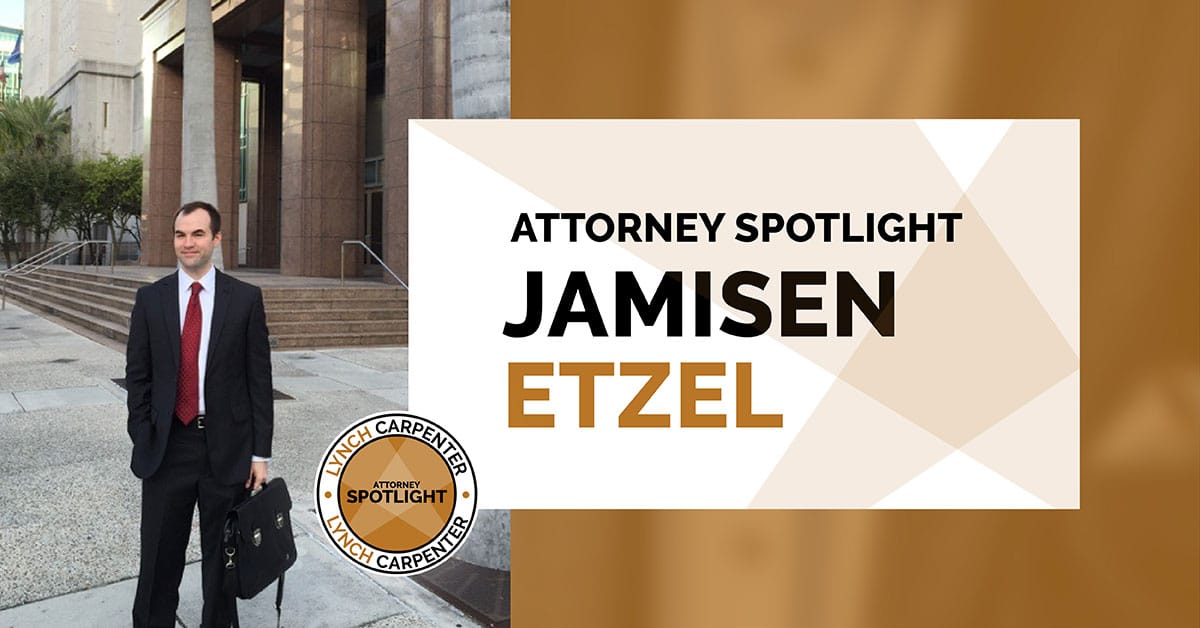
Q&A WITH JAMISEN
Why did you become a lawyer?
Starting in middle school, several experiences sparked me to study constitutional rights and socioeconomic justice. I also always loved reading history, and started following politics during the presidential election in 2000. Still, even though these interests might naturally suggest a career in law or government, I wasn’t sure what I wanted to do when I graduated high school. But during my freshman year in college, I started to see that most of the things I might like to do for work would be more feasible with a law degree. So I started looking into that path, and decided to go for it. I think it was a great choice for me.
Most memorable court room experience?
I can’t pick just one, so I have three, all quite different.
First, we took a case to a jury trial in 2018, and the middle of it was interrupted by a major blizzard, so we had to wait around in snow-covered Philadelphia for a day and half before court reopened. The whole experience was a bit surreal, especially the moment that the jury foreperson read the verdict, which felt pretty dramatic even though we were very confident in our case. Fortunately, the jury awarded our clients everything we sought, so it’s a good memory.
Second, I would say all of my appellate oral arguments have been very memorable. I’ve only done five at this point, so each one is still fresh in my mind. I really enjoy getting to know every detail of a case and the applicable law, and then trying to convince a panel of judges to go our way. It’s not easy, but it is exhilarating and can be fun if you approach it the right way.
Third, I actually served on a jury for a criminal case a couple years ago. I didn’t think I’d get picked given the fact that I’m a lawyer, but I made it through. It was not a major case, but it also wasn’t an easy case, so the deliberations took about a full day, and were a bit contentious at points. Even though I’d been a lawyer for a few years at that point, I learned a lot about our justice system from that experience, and I’ll never forget it.
What are 3 things you couldn’t survive without?
- Friends, family, and my wife. I’ve been very fortunate on all those fronts, and am lucky to be married to someone whose own friends and family are also people I enjoy spending time with. Being surrounded by great people who you love to talk to and celebrate life with is very sustaining.
- Music. It’s always been important to me for a lot of reasons. It keeps the good parts of my brain active and gives my mood a boost whenever I need it.
- Keeping up on the news. This might seem trivial to some people, who can tune it all out and be perfectly happy, but I’m not wired like that. I need to know what’s going on in the world, or I’ll start to feel like I’m trapped in a cave.
Favorite Musician or Band?
My favorite band is The Lawrence Arms, a punk trio from Chicago. More widely-known honorable mentions would be The Cure, Radiohead, and Bruce Hornsby. A weird mix.
Favorite Activity to do in Pittsburgh on the weekend?
Going out to a restaurant or a show with my wife and/or friends.
PREVIOUS ATTORNEY SPOTLIGHTS
Nothing found.
Pittsburgh Lawyer Tapped for ‘Most Diverse Leadership Team Ever’ in Data Breach Class Action MDL
US. District Judge Michelle Childs instructed lawyers to consider a diverse team to lead about 20 lawsuits against Blackbaud. Five weeks later, she followed through.
What has been hailed as one of the most diverse leadership teams to lead a multidistrict litigation docket, a group of eight women and four men, including lawyers of color, will pilot class actions brought over a data breach involving cloud management software firm Blackbaud.
The appointment order (//images.law.com/contrib/content/uploads/documents/292/Critical-Mass-nts-3.3.21-data-breach-leadership-appointment.pdf) did not come from just any judge. U.S. District Judge J. Michelle Childs is a 2010 appointee of President Barack Obama to the South Carolina bench. U.S. Rep. James Clyburn, D-South Carolina, recently floated Childs’ name (https://www.nytimes.com/2021/02/21/us/politics/biden-supreme-court-black-woman.html) as one to be considered as a top pick for the U.S. Supreme Court. If a vacancy is created and she is selected, Childs would be the first Black woman to serve on the high court. That would fulfill a campaign pledge of President Joe Biden.
In a Jan. 8 order, Childs instructed lawyers to consider a diverse team to lead about 20 lawsuits against Blackbaud, which is headquartered in Charleston, South Carolina.
“The court also seeks to develop the future generation of diverse MDL leadership by providing competent candidates with opportunities for substantive participation now,” she wrote.
Five weeks later, on Feb. 16, she followed through.
The team includes four co-lead counsel. Amy Keller (https://dicellolevitt.com/attorney/amy-e-keller/), of Chicago’s DiCello Levitt Gutzler, is a veteran MDL lawyer, having served as co-lead counsel in multidistrict litigation over three other data breaches, involving Equifax, Marriott and American Medical Collection Agency. She and Melissa Emert, of Kantrowitz, Goldhamer & Graifman in Chestnut Ridge, New York, who was appointed to the Blackbaud plaintiffs’ steering committee, had the most appointments in MDLs of any woman attorney from 2016 to 2019 (https://www.law.com/2020/07/06/there-are-new-faces-leading-mdls-and-they-arent-all-men/).
It is the first appointment for Krysta Pachman
(https://www.susmangodfrey.com/attorneys/krysta-kauble-pachman/), of Susman Godfrey in Los Angeles, and Marlon Kimpson (https://www.motleyrice.com/attorneys/marlon-e-kimpson), of Motley Rice, a Democratic state senator in South Carolina, who has worked on other mass torts with name partner Joe Rice (https://www.motleyrice.com/attorneys/joseph-f-rice). It’s the first co-lead counsel role for Harper Segui (https://milberg.com/attorney/harper-t-segui/), a partner in Raleigh, North Carolina, at Whitfeld Bryson, now known as Milberg Coleman Bryson Phillips Grossman. The plaintiffs’ steering committee also includes a lawyer from Pittsburgh’s Lynch Carpenter.
Pachman, speaking for the leadership team, said in an email: “Not only did Judge Childs note her conscious effort to avoid implicit bias and not overlook candidates based on race, color, gender, sexual orientation, age or geography, but she also indicated in her case management order that she expected counsel to perform their duties in a way that is free of discrimination and bias, including choosing a diverse slate of vendors.
“She selected what is arguably the most diverse leadership team ever in an MDL to the benefit of the class.”
In the lawsuits, Blackbaud is accused of failing to adequately respond to hackers whose activities exposed its clients and their customers to exposure of personal data. Blackbaud has said, according to media reports, that it combatted and curtailed the threat from the hack.
On Dec. 15, the U.S. Judicial Panel on Multidistrict Litigation sent the Blackbaud lawsuits to Childs, who has handled one prior MDL.
In assembling the leadership team, Childs appointed lawyers from two competing proposed slates, then added three attorneys who applied individually. She appointed Frank Ulmer, of McCulley McCluer in Charleston, as liaison counsel. In addition to Emert, the plaintiffs’ steering committee is: Gretchen Cappio, of Seattle’s Keller Rohrback; Desiree Cummings of Robbins Geller Rudman & Dowd in New York; Kelly Iverson of Lynch Carpenter; Howard Longman of Stull, Stull & Brody in New York; Douglas McNamara, of Washington, D.C.’s Cohen Milstein Sellers & Toll; and Melissa Weiner, of Pearson, Simon & Warshaw in Minneapolis.
Stonefire Naan $1.9 Million False Ad Settlement Gets Final Nod
By: Bloomberg Law | Julie Steinberg in Washington at jsteinberg@bloomberglaw.com
• Consumers may receive $2.50 per item, no injunctive relief
• Bread allegedly mass-produced despite portrayal as traditional
Stonefire Naan maker FGF Brands Inc. and consumers alleging it duped them into thinking mass-produced breads are hand-baked in traditional tandoor ovens won an Illinois federal court’s final approval for a $1.9 million class settlement.
The deal, which provides class members $2.50 for each product purchased, is fair, reasonable, and adequate, Judge Robert W. Gettleman of the U.S. District Court for the Northern District of Illinois said Tuesday.
Emily Friend alleged FGF Brands, a Canadian company, and its American unit FGF USA Brands Inc. tout their products as “hand-stretched and tandoor oven-baked to honor 2,000 years of tradition.”
But rather than being baked in a traditional tandoor oven, which is operated over a wood- or charcoal-burning fire and can accommodate only one or two pieces of naan at a time, Stonefire bread is produced on an “endless” conveyor belt that rotates through a gas-heated commercial oven capable of baking 15,000 pieces an hour, she alleged.
The nationwide class covers purchasers who bought affected Stonefire products between Nov. 16, 2013, and Oct. 23, 2020.
The court also approved the plaintiffs’ attorneys’ request for approximately $650,000 in fees and costs, and a $7,500 service award to Friend.
Gettleman denied the company’s motion to dismiss the suit in 2019. But he said Friend, who’d become aware of the alleged deception, lacked standing to pursue injunctive relief such as marketing changes because she wouldn’t be fooled in the future, a requirement for such relief.
The deal was preliminarily approved in October 2020.
Lynch Carpenter LLP and Gordon Law Offices represented the plaintiffs. Kirk-land & Ellis LLP represented FGF Brands.
The case is Friend v. FGF Brands (USA), Inc., N.D. Ill., No. 1:18-cv-07644, 2/16/21.
Link to read the full article: https://news.bloomberglaw.com/class-action/stonefire-naan-1-9-million-false-ad-settlement-gets-final-nod
JAMISEN ETZEL OF Lynch Carpenter APPOINTED AS INTERIM CO-LEAD COUNSEL IN COVID-19 TRAVEL INSURANCE LITIGATION
A federal judge in the Southern District of New York appointed Jamisen Etzel of Lynch Carpenter LLP to serve as interim co-lead counsel in litigation on behalf of consumers fighting travel insurance claim denials during the COVID-19 pandemic.
The Hon. John G. Koeltl of the United States District Court for the Southern District of New York granted a motion to appoint plaintiffs’ interim leadership counsel on January 29, 2021. The consolidated proceedings in New York include actions brought by consumers throughout the United States who allege that they purchased travel insurance policies from Generali Group and related entities.
The consumers were subsequently denied benefits or premium refunds when their travel plans were cancelled during the COVID-19 pandemic. In late 2020, the United States Judicial Panel on Multidistrict Litigation transferred all related federal suits against Generali to the Southern District of New York.
The other firms appointed as interim co-lead counsel in addition to Lynch Carpenter LLP include Potts Law Firm and Cafferty Clobes Meriwether and Sprengel LLP. Kirby McInerney was appointed liaison counsel. The executive committee includes Raizner Slania LLP, Sauder Schelkopf LLC, Scott + Scott Attorneys at Law LLP, and Zimmermann Reed LLP.
***
Founded in Pittsburgh in 2004, Lynch Carpenter has earned national acclaim for complex litigation for plaintiffs. Lynch Carpenter LLP is a leading law firm that specializes in cyber security, anti-theft, and consumer protection for more than 30 years. The firm currently has offices in Pittsburgh, Philadelphia, San Diego, Los Angeles and Chicago.
Spotlight: Pamela Miller

Q&A WITH PAMELA
Why did you become a lawyer?
At the core of it is my desire to help the underdog prevail. When I was young I use to hear stories about my dad’s co-workers at the railroad being injured on the job and how the employer would give them such a hard time. I just felt that was so unfair and it created this desire in me to help injured workers. That was my original reason for wanting to be a lawyer. (I am sure watching the Perry Mason reruns helped some too.) Since then my interest has expanded to helping those who cannot work due to their medical impairments to obtain Social Security disability benefits.
Most memorable court room experience?
My most memorable court room experience happened early in my law career when I was trying my second personal injury case. The attorney for the defendant was much more experienced than I was and that made me nervous about trying the case, especially when it came to making my closing argument. But after we had given our closing arguments and the jury was sent to the jury room to deliberate the outcome, the court reporter came up to me and told me that my closing argument and response to the defendant’s closing argument was “great”. Since I knew she had heard hundreds of these closing arguments, her seeking me out to give me this compliment really helped me gain confidence in my ability to summarize and argue my cases.
What are 3 things you couldn’t survive without?
God is first and foremost needed for me to survive as my faith is the center of who I am. Chocolate and my family and friends are the other things I would not want to be without.
What is something people would be surprised to know about you?
I think there are a few things people would be surprised to learn about me, but if I was to list one of them I guess it would be that I owned and rode my own Harley Davidson motorcycle. This was actually an accomplishment for me because for many years I was afraid of riding motorcycles. I took the Pennsylvania Motorcycle Rider Safety course to learn how to ride, and I recommend it to anyone learning to ride.
Favorite activity to do on the weekend?
One of my favorite activities is going camping. It is nice to connect with nature, get away from the pressures of everyday life, and spend time with my husband without interruptions and the internet.
PREVIOUS ATTORNEY SPOTLIGHTS
Nothing found.
Lynch Carpenter Wins Consumer Standing Appeal in Ninth Circuit
Lynch Carpenter attorneys Jamisen Etzel and Kelly Iverson won a significant consumer rights ruling earlier this year from the United States Court of Appeals for the Ninth Circuit. The appeals court held in a published decision that the temporary loss of money is a sufficient “injury-in-fact” under Article III of the Constitution to confer standing on a consumer to file a federal lawsuit.
In the case, called Van v. LLR, Inc., Lynch Carpenter and its client brought suit against the clothing company LuLaRoe, alleging it had improperly overcharged Ms. Van and a class of similarly situated Alaska residents by including a “tax” on its invoices, where the purchases should have been tax free. After being sued by Lynch Carpenter and certain of its clients, but before Ms. Van’s suit was filed, LuLaRoe began refunding the improper charges directly to customer credit card accounts. Those refunds, however, did not credit its customers for all of their damages, nor did it pay compensation for the customers’ lost time value of their money.
The federal district court in Alaska, where Van’s suit was filed, dismissed the case based on lack of subject matter jurisdiction after finding that the consumers’ lost time value of money was “too little” to be a constitutionally recognizable harm conferring standing to sue. Lynch Carpenter appealed that decision, arguing that there is no minimum monetary loss threshold required to obtain standing, and that federal courts traditionally recognize invasions of a person’s possessory interests and the lost time value of money as concrete injuries under the Constitution.
The Ninth Circuit held oral argument on June 3, 2020, and Jamisen Etzel argued on behalf of Ms. Van. The appellate panel agreed with Lynch Carpenter’s position, and on June 24, 2020 reversed the lower court, finding that “[f]or standing purposes, a loss of even a small amount of money is ordinarily an ‘injury,’” and that “the temporary loss of use of one’s money constitutes an injury in fact for purposes of Article III.”
The decision is an important one for consumers because it confirms that they may go to court and obtain interest or other compensation when their money has been improperly held by others for significant periods of time.
You can read the full opinion at this link. The judges of the Ninth Circuit panel were Morgan Christen, Paul J. Watford, and Bridget S. Bade. Jamisen Etzel led the appellate briefing and oral argument. Kelly Iverson assisted in the appeal and serves as lead counsel in Lynch Carpenter’s cases against LuLaRoe.
Judge Appoints ‘Team of Rivals’ to Lead TikTok Privacy Class Action Lawsuits
 On Monday, a federal judge appointed lawyers to lead the privacy class actions against TikTok who previously accused each other of mishandling the litigation. They include co-lead counsel Ekwan How of Bird Marella and Katrina Carroll of Lynch Carpenter.
On Monday, a federal judge appointed lawyers to lead the privacy class actions against TikTok who previously accused each other of mishandling the litigation. They include co-lead counsel Ekwan How of Bird Marella and Katrina Carroll of Lynch Carpenter.
A Chicago federal judge has named a leadership group for privacy class actions against TikTok, in the wake of a selection process that often featured infighting among plaintiffs counsel.
Two groups of plaintiffs lawyers battled over leadership of the multi district litigation — about 20 class actions sent last month to U.S. District Judge John Lee of the Northern District of Illinois. One group, led by Katrina Carroll, of Lynch Carpenter in Chicago, and Jonathan Jagher of Freed Kanner London & Millen in Conshohocken, Pennsylvania, insisted they had reached a confidential settlement of the cases last month. The other, led by Megan Jones, a San Francisco partner at Hausfeld, and Ekwan Rhow of Los Angeles-based Bird, Marella, Boxer, Wolpert, Nessim, Drooks, Lincenberg & Rhow, raised concerns about the negotiations, in which they did not participate.
On Monday, Lee appointed How and Carroll as co-lead counsel, along with Elizabeth Fegan, of FeganScott, who supported Carroll’s group.
Lee, who previously has cautioned lawyers to work together and include all parties in settlement negotiations, did so again in his leadership order.
“The court anticipates that the plaintiffs’ leadership group will work by consensus and that plaintiffs’ counsel in particular will do everything possible to facilitate a consensus decision-making process,” Lee wrote. “It also is worth emphasizing that cooperation by and among all members of the plaintiffs’ leadership group is essential for the orderly and efficient resolution of this MDL.”
He ordered lead counsel to submit a proposal by Oct. 9 on how they plan to work together, with a status report due Oct. 30 that includes updates on the proposed settlement.
He set a virtual hearing for Nov. 4.
Carroll, in an email, said, “I look forward to proceeding in a coordinated effort for the benefit of our clients and the class.” How did not respond to a request for comment.
The defendant, TikTok Inc., is the developer of a popular app for creating short form videos on mobile devices. It got a reprieve from being banned in the United States on Sunday.
The battle for class action leadership comes as President Donald Trump, citing national security concerns, issued orders last month, one of which threatened to limit new downloads of TikTok in the United States by Sept. 20, later extended to Sept. 27, if it did not reach a real with a U.S. company.
TikTok, whose Chinese-based parent ByteDance announced plans to sell its U.S. operations to Oracle and Walmart, countered with its own lawsuit against the U.S. government. In that case, a federal judge in the District of Columbia struck down Trump’s order. The order, unsealed on Monday, found the International Emergency Economic Powers Act, cited in Trump’s order, exempted “informational materials” and “Personal communication” with no economic value, both of which are largely TikTok’s content.
In a related case, a federal judge in Pennsylvania on Sept. 26 rejected a motion for temporary restraining order brought by three TikTok users challenging trump’s order on constitutional grounds.
The fight among the lawyers in the privacy cases adds another unusual twist for TikTok. Those cases allege the video sharing app did not inform users, who include minors, that it was collecting their biometric data, in violation of the Illinois Biometric Privacy Act, which provides statutory damages between $1,000 and $5,000 per violation, as well as other computer and privacy laws.
Problems among the lawyers surfaced a few months before Aug. 4, when the U.S. Judicial Panel Multidistrict Litigation sent the cases to Lee’s courtroom.
Days after the transfer of the cases, TikTok and Carroll’s group informed Lee in an Aug. 16 joint status report that they had reached a class action settlement “in principle” following a mediation three days earlier. The settlement, which they anticipated filing in court Oct. 26 for preliminary approval, must remain confidential, they wrote, because of TikTok’s sale discussions.
The settlement didn’t involve everyone. Carroll, in her Sept. 8 for leadership, insisted that Rhow’s group, despite having conducted their own failed mediation talks with TikTok on April 6, refused to participate in the negotiations last month.
In her leadership application papers, she cautioned that a “forced marriage” with Rhow’s team “could derail the settlement and irreparably harm the class.”
Rhow, in court papers, has countered that TikTok chose to settle with a preferred group of plaintiffs lawyers, who shut his group out of negotiations. He insisted that TikTok had prohibited him from attending the mediation and, since then, has kept the settlement a secret.
His group raised concerns about the impact that the “destruction of crucial evidence” under Trump’s executive orders and TikTok’s imminent sale would have on the privacy class actions.
TikTok, which continued to support the settlement, took the unusual step of getting involved in the fight, praising Carroll’s group, who had negotiated the deal, which criticizing Rhow’s group for “overaggressive and excessive pleadings, emergency motions, and attempts to sabotage the efforts of other parties to resolve the litigation.”
Monday’s order created a plaintiffs’ steering committee made up of lawyers in both groups. In Rhow’s group, Jones and Amanda Klevorn, of Burns Charest, joined the committee. Support Carroll’s group were Jagher; Michael Gervais, of Susman Godfrey; and Albert Chang, of Bottini & Bottini.
Lee also appointed Shannon McNulty, of Clifford Law Offices, who was part of Rhow’s group as liaison counsel.
At a Sept. 24 hearing, Lee insisted that putting the dueling lawyers together would prevent fights down the road.
“Some in their briefs suggest that the court need not go this route and characterized such an approach as a ‘forced marriage,” he said, according to the transcript. “Others referred to this as a ‘team of rivals.’ I, myself, rather than referring to it in those terms, would like to think of it as an all-star team of sorts or an Olympic team, made up of individuals from perhaps different individual teams, but who are asked to come together to pursue the interests of all of the plaintiffs as a whole in this litigation."
Spotlight: Eddie Kim
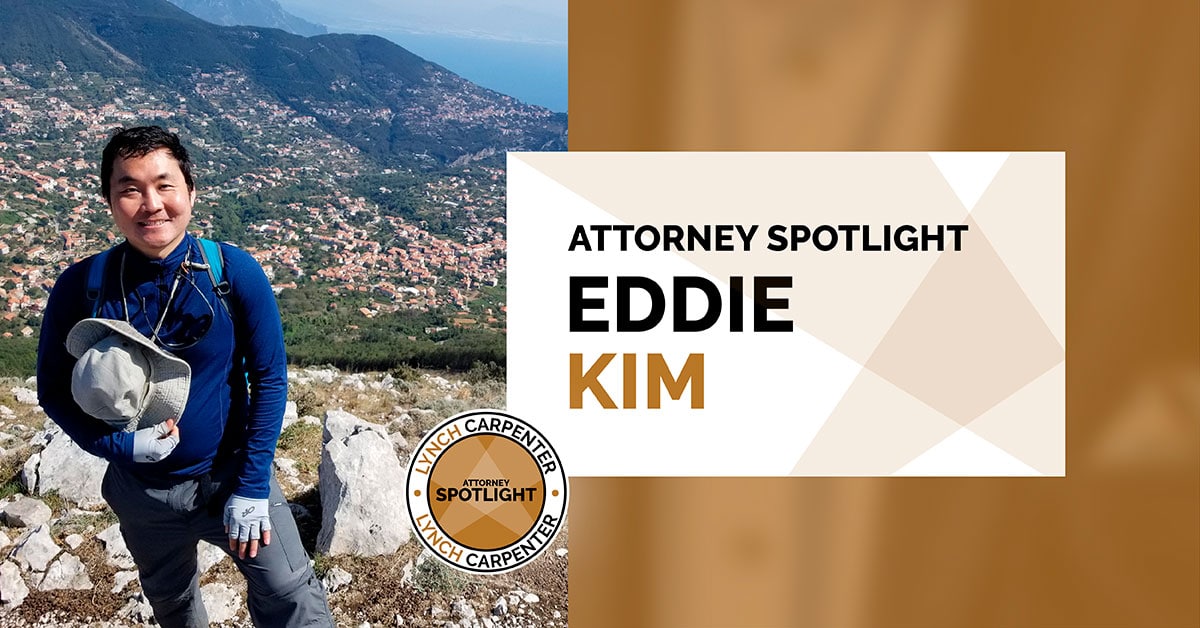
Q&A WITH EDDIE
Why did you become a lawyer?
The primary reason that I became a lawyer is that I come from a non-English-speaking, blue-collar, immigrant family, and it became very evident to me that we needed someone in the family who had a better understanding of American institutions to help navigate through all of the things that life throws at you. As a natural offshoot of this intention was the appeal of helping others who are underdogs or need a voice, which led me to pursue public interest work and now consumer protection law.
What are three things you couldn’t survive without?
Nearby hiking trails in mountains and forests; late night eateries; guitar.
Favorite musician or band?
Radiohead and Led Zeppelin.
Favorite thing to do on the weekend?
I have recently gotten into learning to do a bit of cooking (not particularly well) and hosting group dinners.
Most memorable court room experience?
Participating in a trial against Wells Fargo challenging its unlawful overdraft fee practices that resulted in a verdict for a large class of customers. It was rewarding to see justice being accomplished and help effect change on a large scale that primarily helped people at lower income levels.
PREVIOUS ATTORNEY SPOTLIGHTS
Nothing found.
Federal Judge Turns to Class Action Veterans to Lead Wawa Data Breach Litigation
The leaders are set to handle three tranches of litigation: one brought by consumers, another from financial institutions, and the last involving employees.
Lawyers who’ve been involved in a range of class actions, from the Equifax and Capital One data breach cases to drug marketing litigation, have been selected to lead a mass action against the regional convenience store chain Wawa.
U.S. District Judge Gene Pratter of the Eastern District of Pennsylvania on June 12 selected nine attorneys from Pennsylvania and New York to act as co-lead, class and liaison counsel in the proposed class action lawsuit over the hack announced late last year that exposed payment card information from Wawa users at potentially all of the company’s locations. The leaders are set to handle three tranches of litigation: one brought by consumers, another from financial institutions, and the last involving employees.
Specifically, Pratter appointed Sherrie Savett of Berger Montague; Roberta Liebenberg of Fine, Kaplan and Black; Benjamin Johns of Chimicles Schwartz Kriner & Donaldson-Smith; and Linda Nussbaum of Nussbaum Law Group as interim co-lead counsel for the consumer class action cases.
For the lawsuits brought by financial institutions, the judge appointed Gary Lynch of Lynch Carpenter; Christian Levis of Lowey Dannenberg; and Jeannine Kenney of Hausfeld as interim class counsel, with Mindee Reuben of Lite DePalma Greenberg also being appointed as interim liaison counsel for that group.
Pratter also appointed Donald Haviland of Haviland Hughes as interim class counsel for the employee plaintiffs.
According to Pratter, with the appointments, the attorneys are now tasked with developing and performing the discovery, coordinating meetings and calls, examining witnesses and acting as the primary point of contact between the parties and the court. Pratter also said the attorneys could apply for long-term leadership positions as well.
“The main criteria for such leadership will be willingness and availability to commit to a time-consuming project, ability to work cooperatively with others, professional experience in this type of litigation, and access to sufficient resources to prosecute the litigation in a timely manner,” Pratter said.
The appointment settles a dispute that had arisen between several firms over who should lead the class action.
In early January, Johns and Savett filed motions in the cases asking the court to consolidate the proposed class actions and have them appointed as lead counsel. The motions also asked the court to appoint attorneys from Ahdoot & Wolfson in Los Angeles; Federman & Sherwood in Oklahoma City; Philadelphia-based Kohn Swift & Graf; and New York-based firms Stull, Stull & Brody and Milberg Phillips Grossman.
Nussbaum, however, filed a response, saying the request by Johns and Savett was “premature” and that she also planned to move to be appointed lead counsel.
The first lawsuits over the data breach began to be filed Dec. 20—the day after Wawa’s CEO said in an open letter there had been a breach of the company card payment data. According to the letter, malware that had been active since March was discovered Dec. 10, and the company contained it by Dec. 12. The letter said the malware potentially exposed payment card information from customers at all Wawa locations, including credit and debit card numbers, expiration dates and names.
Attorneys said they appreciated being appointed to the position.
“We are pleased with the court’s order, and look forward to moving the case forward on behalf of the consumer plaintiffs,” Johns said.
In a statement published online, Kenney said, “I am honored to be serving with such talented co-counsel and look forward to obtaining relief for credit unions and other financial institutions injured by this data breach.”
Lynch and Reuben both declined to comment and Savett, Liebenberg, Nussbam, Levis and Haviland did not return a call seeking comment.
Lynch Carpenter NAMED LITIGATION DEPARTMENT OF THE YEAR BY THE
LEGAL INTELLIGENCER
The Legal Intelligencer is pleased to announce the 2020 Professional Excellence Award winners. We are delighted to highlight the great work and achievements across the full breadth of the Pennsylvania legal community.
Litigation Department of the Year (General)
Lynch Carpenter, LLP
“We are honored to be selected as the Litigation Department of the Year by the Legal Intelligencer. Congratulations to our incredible team of attorneys and staff who continuously pursue justice for the men, women and children around the country.” - Bruce Carlson and Gary Lynch


